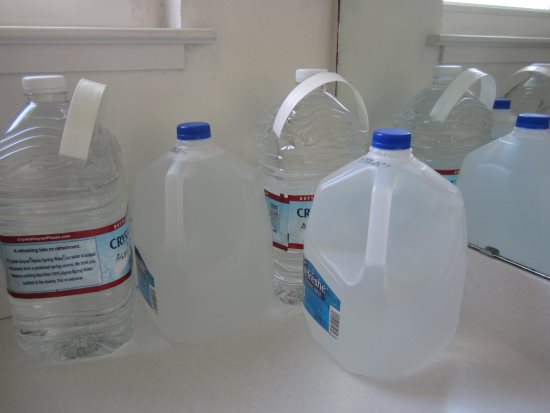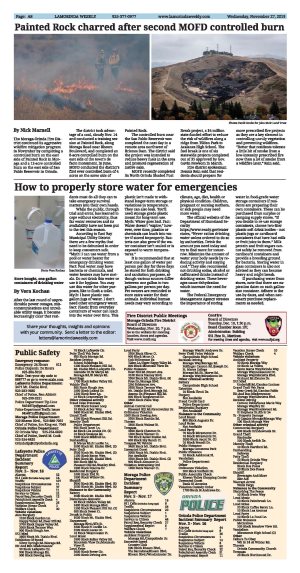| | Published November 27th, 2019
| How to properly store water for emergencies
| | | By Vera Kochan |  | | Store bought, one-gallon containers of drinking water Photo Vera Kochan |
After the last round of unpredictable power outages, miscommunications and unreliable utility usage, it became increasingly clear that residents must do all they can to take emergency survival matters into their own hands.
 While the public, through trial and error, has learned to cope without electricity, thus far water resources and its availability have not been put to the test this season.
While the public, through trial and error, has learned to cope without electricity, thus far water resources and its availability have not been put to the test this season.
 According to East Bay Municipal Utility District there are a few myths that need to be debunked in order to keep consumers safe. "Myth: I can use water from a pool or water heater for emergency drinking water. Fact: Pool water may have bacteria or chemicals, and water heaters may have metals. Do not drink this water or use it for hygiene. You may use this water for other purposes, like to flush a toilet. Myth: I have plastic one-gallon jugs of water. I don't need other emergency water. Fact: Plastic from everyday containers of water can leach into the water over time. This plastic isn't made to withstand longer-term storage or variations in temperature. They can also leak. You'll need storage grade plastic meant for long-term use. Myth: Water goes bad. Fact: Water doesn't "expire," however, over time, plastics or chemicals can leach into water if stored improperly. Bacteria can also grow if the water container isn't sealed or is exposed to warm temperatures."
According to East Bay Municipal Utility District there are a few myths that need to be debunked in order to keep consumers safe. "Myth: I can use water from a pool or water heater for emergency drinking water. Fact: Pool water may have bacteria or chemicals, and water heaters may have metals. Do not drink this water or use it for hygiene. You may use this water for other purposes, like to flush a toilet. Myth: I have plastic one-gallon jugs of water. I don't need other emergency water. Fact: Plastic from everyday containers of water can leach into the water over time. This plastic isn't made to withstand longer-term storage or variations in temperature. They can also leak. You'll need storage grade plastic meant for long-term use. Myth: Water goes bad. Fact: Water doesn't "expire," however, over time, plastics or chemicals can leach into water if stored improperly. Bacteria can also grow if the water container isn't sealed or is exposed to warm temperatures."
 It is recommended that at least one gallon of water per person per day for three days be stored for both drinking and sanitation purposes, although various sources differ between one gallon to two gallons per person per day. Pet owners are reminded to store extra water for their animals. Individual human needs may vary according to climate, age, diet, health or physical condition. Children, pregnant or nursing mothers, or sick people may need more water.
It is recommended that at least one gallon of water per person per day for three days be stored for both drinking and sanitation purposes, although various sources differ between one gallon to two gallons per person per day. Pet owners are reminded to store extra water for their animals. Individual human needs may vary according to climate, age, diet, health or physical condition. Children, pregnant or nursing mothers, or sick people may need more water.
 The official website of the Department of Homeland Security https://www.ready.gov/water states, "Never ration drinking water unless ordered to do so by authorities. Drink the amount you need today and try to find more for tomorrow. Minimize the amount of water your body needs by reducing activity and staying cool." They also recommend not drinking sodas, alcohol or caffeinated drinks instead of drinking water. These beverages cause dehydration which increase the need for water.
The official website of the Department of Homeland Security https://www.ready.gov/water states, "Never ration drinking water unless ordered to do so by authorities. Drink the amount you need today and try to find more for tomorrow. Minimize the amount of water your body needs by reducing activity and staying cool." They also recommend not drinking sodas, alcohol or caffeinated drinks instead of drinking water. These beverages cause dehydration which increase the need for water.
 The Federal Emergency Management Agency stresses the importance of storing water in food-grade water storage containers if residents are preparing their own containers. These can be purchased from surplus or camping supply stores. "If you decide to re-use storage containers, choose two-liter plastic soft drink bottles - not plastic jugs or cardboard containers that have had milk or fruit juice in them." Milk protein and fruit sugars cannot safely be removed from cardboard containers and provide a breeding ground for bacteria. Storing water in glass containers is also not advised as they can become heavy and might break.
The Federal Emergency Management Agency stresses the importance of storing water in food-grade water storage containers if residents are preparing their own containers. These can be purchased from surplus or camping supply stores. "If you decide to re-use storage containers, choose two-liter plastic soft drink bottles - not plastic jugs or cardboard containers that have had milk or fruit juice in them." Milk protein and fruit sugars cannot safely be removed from cardboard containers and provide a breeding ground for bacteria. Storing water in glass containers is also not advised as they can become heavy and might break.
 If purchasing water from stores, note that there are expiration dates on each gallon-size container. Adhere to the use-by dates, and when necessary purchase replacements as needed.
If purchasing water from stores, note that there are expiration dates on each gallon-size container. Adhere to the use-by dates, and when necessary purchase replacements as needed. |
| | | | | | | | | | | | |



